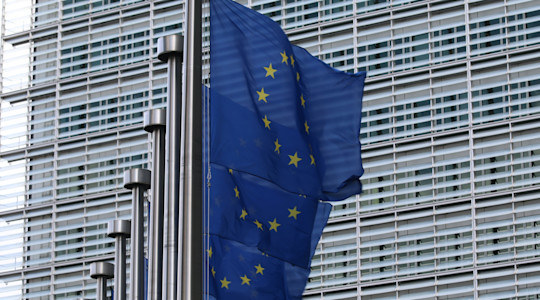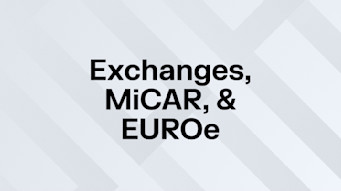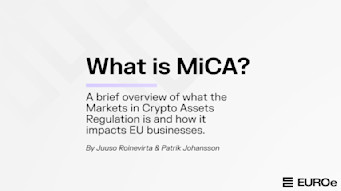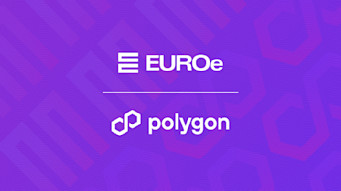
The US financial regulators have placed one of the largest dollar stablecoins under scrutiny, with the New York Department of Financial Services ordering Paxos Trust Co. to halt the creation of its BUSD stablecoin. This development comes amid a regulatory crackdown on crypto companies that have witnessed increased enforcement actions this year. As a result of the current ambiguity surrounding US regulations, stablecoin issuers within the area may encounter legal and regulatory obstacles in the near future, which is an unfortunate turn of events given the enormous value, transactions, and activity USD stablecoins represent in the global cryptocurrency landscape.
On the other hand, the EU’s regulatory landscape concerning stablecoins is much clearer. Currently, EU-based stablecoin operators are regulated by the European Anti-Money Laundering Directive 5 (AMLD5), which is implemented into member states’ national legislation. However, e-money stablecoins, such as EUROe, are regulated under the European E-Money Directive and Payment Services Directive 2 (PSD2). These clear regulatory guidelines ensure that electronic money stablecoins, such as EUROe, are not operating in the grey areas, and their users can be sure of the legal framework under which such stablecoins are regulated.
Furthermore, the EU is set to introduce new crypto-asset legislation with the introduction of Markets in Crypto-Assets Regulation (MiCA) in circa 2024. MiCA sets forth new requirements for capital controls and further consolidates the standing of compliant stablecoins in the EU.
In conclusion, EU-regulated stablecoins are subject to well-known and established statutes with clear pathways for future development. While US-based stablecoins may be subject to unknown developments in the short term, stablecoins regulated under EU legislation will not be adversely affected. EUROe is regulated as electronic money in the EU and will remain so in the foreseeable future. MiCA will impose additional requirements on Membrane Finance but will not negatively impact EUROe's users or customers.
All articles

Paxos to Acquire Finnish E-Money Institution Membrane Finance

MiCA, CASPs, and EMTs – How EUROe Helps Exchanges Transition into MiCA

Membrane Finance Launches EUROe Ramp: Fiat Connectivity for Blockchain Protocols

Introducing Bridged EUROe to Scale Euro Liquidity

Membrane Finance Brings the First Stablecoin to Concordium

EUROe To Integrate Concordium – A Permissionless Blockchain with Built-In IDs

EUROe Helps CASPs & CEXes Stay MiCAR-Compliant

Obligate and Membrane Finance Join Forces to Revolutionise Debt Financing

Membrane Finance Brings the First Euro Stablecoin to Solana – Along With Card Payments

What is MiCA?

Membrane Finance Announces Blockchain Integration Offering

Mt Pelerin partners with EUROe to offer zero-fees on/off-ramp

EUROe Is Now Available through Woorton’s OTC Infrastructure

Lamar Olive Oil's Innovative On-Chain Bond Issuance Using EUROe

deltaDAO Facilitated a Data Market Transaction Using EUROe

Membrane Finance Launches EUROe Account API to Bridge Traditional and Blockchain-Based Economies

Membrane Finance Launches the First MiCA-Compliant Stablecoin, EUROe, on Avalanche

Membrane Finance and Januar team up to pave the way for MiCA compliant financial technology

Membrane Finance Launches EUROe on Arbitrum One

Membrane Finance Launches EUROe on Polygon

deltaDAO, Membrane Finance, and Polygon Labs bring EUROe to the Gaia-X Web3 ecosystem as main settlement token

Unlocking the Potential of Tokenisation and Stablecoins: The Next Big Thing in Asset Management

Membrane Finance launches EUROe on Ethereum

Membrane Finance Announces Integration with Fireblocks to Enhance Operational Security of the EUROe Stablecoin

Equilibrium backs Membrane Finance in building core EUROe systems

Membrane Finance appoints KPMG as its internal auditor

Runtime Verification completes a smart contract audit for the first EU-based regulated stablecoin EUROe

Nordic Law acts as a legal advisor to Membrane Finance

Membrane Finance Announces the First Regulated Euro Stablecoin EUROe and Raises a Seed Round

What are Stablecoins?
